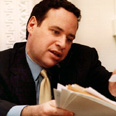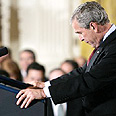

Man who invented 'axis of evil' speaks out
President Bush has two important White House speeches coming up this month, and preparations are in full force. David Frum has been there, knows how stressful it is. 'You have influence, but sometimes you find yourself writing things for president that you wouldn't right if you were president,' he says in special Ynet interview
David Frum has been there in the White House, and has written such speeches for Bush. He has left his mark on history with the unforgettable "axis of evil" speech on January 29, 2002, which he wrote. This was the speech in which Bush identified Iraq, Iran and North Korea as dangerous countries that deal with terrorism and are arming themselves with weapons of mass destruction.
The 'axis of evil' speech was the key to understanding Bush's policy in the coming years, and paved the way to the war in Iraq.

Bush at State of the Union Address last year (Photo: Reuters)
"The president of the United States makes about 300 speeches a year. In an election year like 2004, the president made 500 speeches. Most of those are just made from notes. A few of them are more important and are made from a text. And then a few of them are very important, and they are made with a lot of collaboration. Then once a year is the most important speech, the State of the Union," outlined Frum in a special interview with Ynet.
How was the 'axis of evil' speech written?
"It is worked on by teams of people. A State of the Union is broken into pieces, topic areas. Elaborate research is done and there is a lot of arguing about what should go in it, and there are memos and drafts that are circulated.
"The language of the 'axis of evil' began in a memo. Overall, it was about an eight-week process," explained Frum.
Frum continued, "When people think about presidential speeches, they think about the big ones. Yet, everyday, the president will have something like this on his calendar: There was a flood in a town, and the local fire department heroically worked three days without sleeping to pile the sandbags and save the town. They're now coming to the White House for recognition. This is the most important day in their life.
"But the president is fitting it in between a crisis in North Korea and a crisis on the stock market. So, he has to walk in and say something that is beautiful that these people will take home with them. Having many speechwriters ensures that the president can pull the speech out of his pocket, perhaps not even having read it carefully, and he can be wonderful and gracious and emotional. He can give those people what they deserve for their heroism," explained Frum.
"Everyone in the world wants a piece of the president's mind, but he only has the same 24 hours in a day as everybody else," quipped Frum.
'You have influence'
Except, that mind isn't the mind of the president; this is mainly the minds surrounding him. Speech writers are usually people in their late 20s, early 30s, but coming in, Frum was exceptional. A journalist from a pro-Israel, Jewish Canadian family of journalists, he came to the White House as a speech writer at the age of 40 with a long list of books and articles to his name. As such, he didn't need to prove himself.
"Because I had my own reputation, I wasn't there to prove myself and could say, 'I'm here to help another person say what he wants to say.' And I often found myself in the working in a situation whereby in the freak circumstance that I were president, I wouldn't have said those things.
"But that's okay, he was elected. And just like a lawyer helps the client make the best case the client can, or like an editor helps the writer make the best book the writer can, so I think a speechwriter helps his principal make the best speech he can, even if he may not necessarily agree with all of it," explained Frum.
That must come with no small frustration. You are sitting in the White House next to the most influential people in the world, and you want to make your mark, but you need to do this carefully.
"You have influence, but you also have to have modesty. You shouldn't try for more influence as a writer than you're entitled to. But you're in the building, so you can make suggestions and argue for ideas. That's where the real influence shows up. By doing your work, you acquire the right to be heard. But sometimes – and this happens to everybody up to the vice president and the president's wife – the president will say, 'Thank you, but I don't agree,'" Frum elaborated.
Frum rejected claims that the 'axis of evil' speech worsened the position of the United States, which is sinking in Iraq, is finding it difficult to contain North Korea, and Iran is on its way to being nuclear.
"The argument has been made that by naming these three countries together, provoked them and forced them into a relationship with the president that they did not already have. I think this is childish. Children believe that when you give something a name, you call it into being, and if you don't give it a name, it doesn't exist.
"North Korean and Iran were vigorously cooperating. Pakistan is also playing a double game. The Pakistanis and the Saudis are a problem, but they're not an enemy. The president named something that it was important for people to know about, and once you name it, you have the possibility of action.
"If the action is inadequate or unsuccessful, the president will be negatively judged. However, I think we are better off when we recognize the problem, than when we denied and ignored the problem," explained Frum.
What is your suggestion for the Iranian problem?
"I think the Iranians must be made to see that the consequences of proceeding are very expensive… Iran is seeking to acquire certain weapons to tilt the strategic balance in its favor. But because Iran is so technologically primitive, and because its armory is Russia, it is not difficult for the nations of the West to ensure that each step the Iranians take to try to tilt the balance in their favor, in fact might make things worse by providing Israel with more accurate bombs and missiles."
And what about Iraq?
"We all expected Iraq to be managed more successfully. There are many arguments about what went wrong in Iraq. The US decided to use a very light military force to defeat Saddam, and then to maintain a large and prolonged occupation afterwards. This was premised on the idea that the United States will quickly help bring to power an Iraqi provisional government that would work toward elections under someone like Ahmad Chalabi.
Once the State Department and the CIA argued that they don't want Chalabi, and there isn't anyone else who can lead a provisional government in their eyes, a prolonged US occupation was needed that could begin the political process, but then you need a big army. And so we have two pieces that did not fit: a light army, and a heavy occupation. That's the root of the problem."
"The White House is a very emotionally demanding, and time consuming place to work. One of the consequences of this is that the very demands of work can get in the way of clear thinking. So there is a tendency in any White House to get caught up in emergencies and to lose sight of the agenda…
"There is a famous line attributed to Abraham Lincoln: 'I do not pretend to control events, but freely admit that events have controlled me.' If the greatest of American presidents can say such a thing, I think it is true for all of them," attested Frum.















